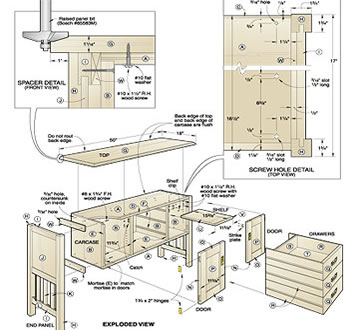
Best selling wood projects
We have been clearing lantana from the front paddock near my shed, so the wall mirror has taken a back seat owing to my general knackered-ness at the end of each day.
However, today provided some shed time so I picked up from where I left off. Here is the finished mortise that once housed a couple of dowel holes.

Next step is to measure the dimensions of said hole and transfer these to a suitable offcut of matching silky oak.

- I used a set of vernier calipers to measure the cavity and ....
- Transferred that measure to a marking gauge before scribing the block to be cut.
- Spear & Jackson did the honours, and ....
- Stanley cleaned up the plug and brought it down to a snug fit.

Here it is in place waiting for the glue to dry.
Once that happens it will be planed flush.
Time to cut the mortises ... in the top and bottom rails that will make up the frame.
The sides will have tenons top and bottom - Ill get to them shortly.

I decided to use my router to cut the mortises, as I had a router bit that was approximately 1/3 of the thickness of the timber. I mounted both top and bottom pieces together, and by setting the router fence once, both mortises can be cut by simply turning the router around and placing the fence on the other side for the second cut. Doing it this way also provides a wider support base for the router to sit on.
- Each slot was cut using three passes of the router at a greater depth each time.
- Do the same with the second cut by rotating the router to the other side.
- The completed mortises side by side.

There is a reason that I always think twice before cutting mortises with the router.
Yep - it throws wood dust everywhere.
Never get this problem when I cut mortices by chisel.
Truth be told - for a handfull of mortices, there is little difference in the time it takes - only in the mess that it leaves.
Time to cut the tenons.

- A tenon saw cuts both sides.
- Measure the tenons to suit each mortise. This keeps them snug and tight by allowing for any variations in the sizes of the mortises.
- After cutting off the little nibs from each end, clean up the tenon shoulders and the tongue with a shoulder plane.
- I like to cut a small chamfer on both leading edges of the tenon tongue - helps it slide home more easily, and allows a little volume for the glue to pool inside the mortise. This helps prevent squirt-out.

Next time in Part III - Ill complete assembly and add some finishing touches.
Cool!
Best selling wood projects

0 komentar:
Posting Komentar